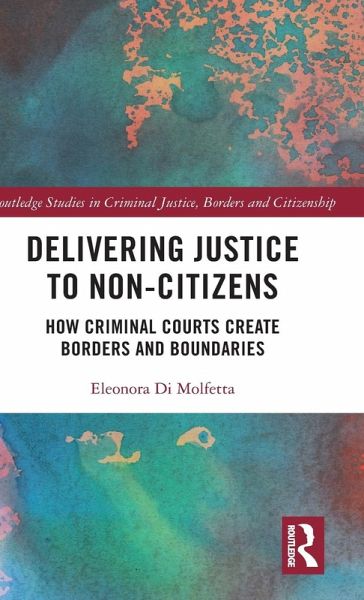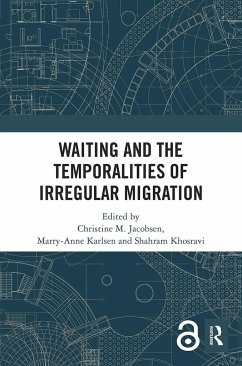
Delivering Justice to Non-Citizens
How Criminal Courts Create Borders and Boundaries
Versandkostenfrei!
Versandfertig in 6-10 Tagen
154,99 €
inkl. MwSt.
Weitere Ausgaben:

PAYBACK Punkte
77 °P sammeln!
How does justice for non-citizens look like? This book provides a nuanced cross-section of how criminal courts deliver justice to non-citizens, investigating rationales and purposes of penal power directed at foreign defendants. It examines how lack of citizenship alters the contours of justice, creating a different system oriented at control and exclusion of non-members. Drawing on ethnographic research in an Italian criminal court, the book details how citizenship and national belonging not only matter, but are matters reproduced, elaborated, and negotiated throughout the judicial process, e...
How does justice for non-citizens look like? This book provides a nuanced cross-section of how criminal courts deliver justice to non-citizens, investigating rationales and purposes of penal power directed at foreign defendants. It examines how lack of citizenship alters the contours of justice, creating a different system oriented at control and exclusion of non-members. Drawing on ethnographic research in an Italian criminal court, the book details how citizenship and national belonging not only matter, but are matters reproduced, elaborated, and negotiated throughout the judicial process, exploring the implications of this development for the understanding of penal power and the role of criminal courts.
Set in the context of the growing intersection between migration control and penal power, Delivering Justice to Non-Citizens explores whether and how instances of border control have seeped into judicial practices. In doing so, it fills a significant gap in the scholarship on border criminology by considering a rather unexplored actor in the field of migration studies: criminal courts. Based on a year of courtroom ethnography in Turin, Delivering Justice to Non-Citizens relies on interviews with courtroom actors, courthouse observations, analysis of court files, together with local media analysis, to provide a vivid image of judicial practices towards foreign defendants in a medium-size criminal court. It considers and balances the distinctive traits of the local context with ongoing global processes and transformations and adds much needed insights into how global processes impact local realities and how the local, in turn, adjusts to global challenges. Through instances of everyday justice, the book calls attention to how migration control has silently seeped into the judicial realm.
The book will be of interest to students and academics in sociology, criminology, law, penology, and migration studies. It will also be an important reading for legal practitioners, magistrates, and other law enforcement authorities.
Set in the context of the growing intersection between migration control and penal power, Delivering Justice to Non-Citizens explores whether and how instances of border control have seeped into judicial practices. In doing so, it fills a significant gap in the scholarship on border criminology by considering a rather unexplored actor in the field of migration studies: criminal courts. Based on a year of courtroom ethnography in Turin, Delivering Justice to Non-Citizens relies on interviews with courtroom actors, courthouse observations, analysis of court files, together with local media analysis, to provide a vivid image of judicial practices towards foreign defendants in a medium-size criminal court. It considers and balances the distinctive traits of the local context with ongoing global processes and transformations and adds much needed insights into how global processes impact local realities and how the local, in turn, adjusts to global challenges. Through instances of everyday justice, the book calls attention to how migration control has silently seeped into the judicial realm.
The book will be of interest to students and academics in sociology, criminology, law, penology, and migration studies. It will also be an important reading for legal practitioners, magistrates, and other law enforcement authorities.














